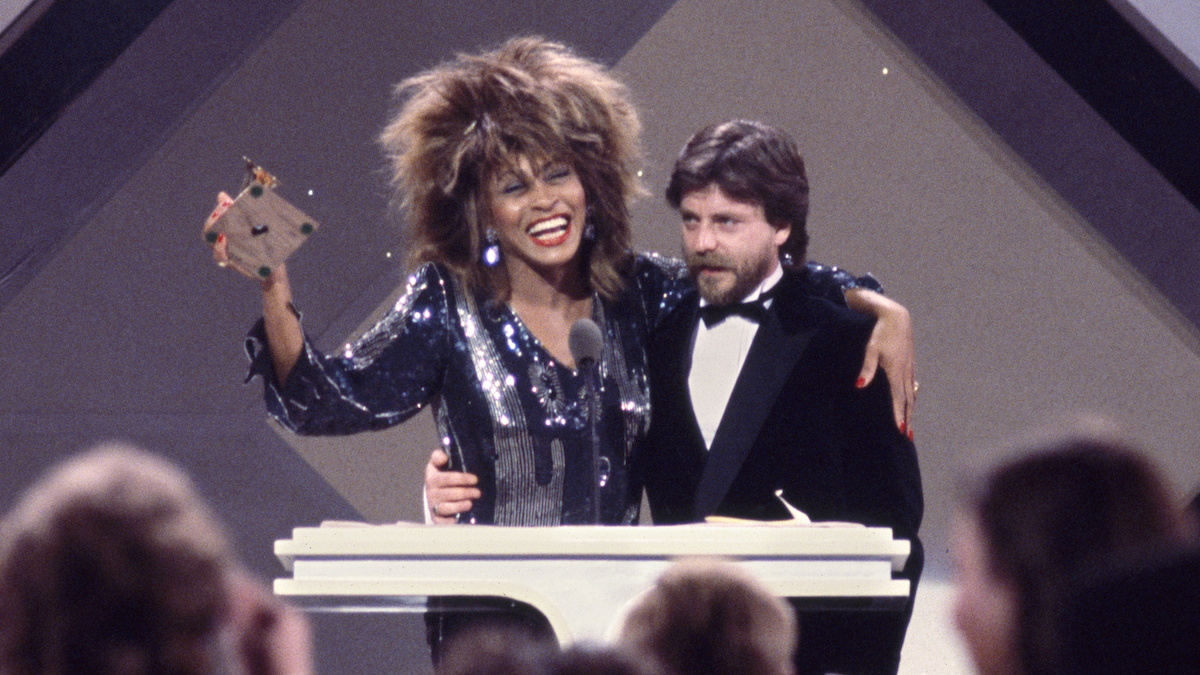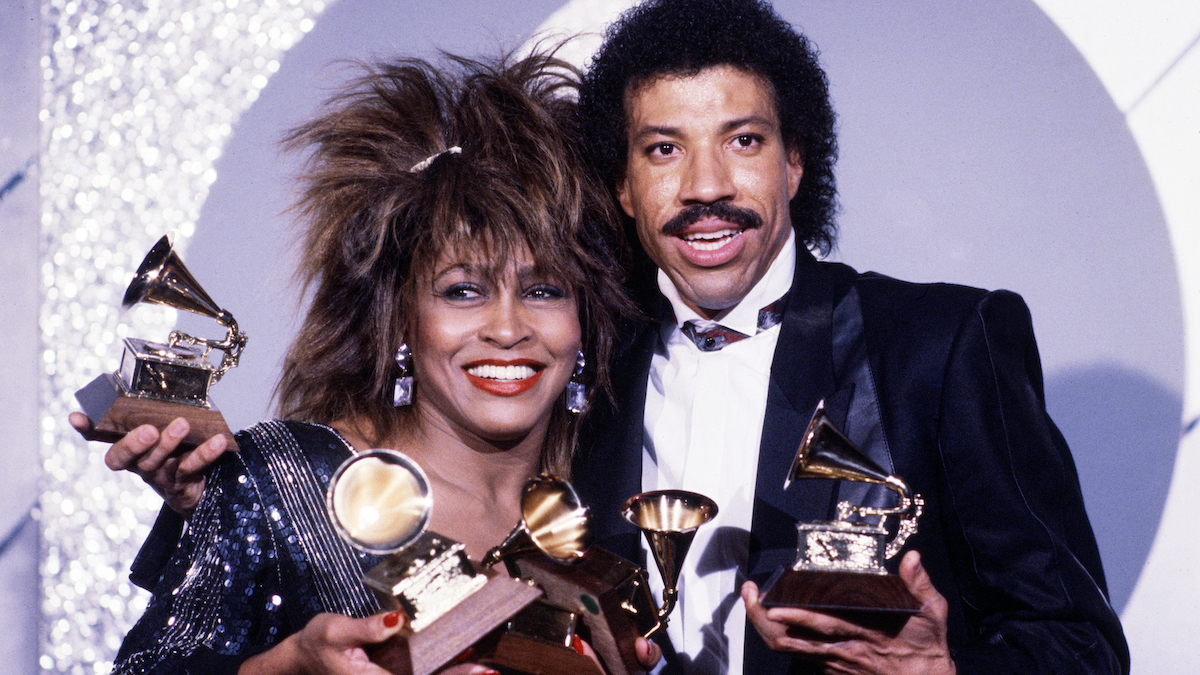The Tina Turner smash hit she thought was "throwaway pop", but ended up saving her career: "It was David Bowie who first got Capitol interested in reviving Tina's career"
"Afterwards she told me that it was the hardest vocal she'd ever had to do in her life," said songwriter Terry Britten in a classic 1986 interview

Terry Britten is one of the best-selling songsmiths of our time, having written or co-written huge tracks for artists including Michael Jackson, Cliff Richard, Lenny Kravitz, Cathy Dennis, and Celine Dion. However, his songs for Tina Turner are not only his most successful, but they gave a huge boost to the late singer's career back in the mid 1980s.
Britten co-wrote What's Love Got to Do with It, which reached number one in the US in 1985 and won him a Grammy – see the picture of him collecting it with Tina above – and he then also had a hand in many other Turner songs including We Don't Need Another Hero for the film Mad Max Beyond Thunderdome.
However, as successful as these songs were, his relationship with Tina didn't get off on quite the right footing as she considered some of his songs 'throwaway pop'. In fact, she nearly turned down the very song that rescued her career…
in a 1986 interview with International Musician and Recording World, Britten discussed how the song What's Love Got to Do with It came together in just a couple of hours, but that he needed to persuade Turner that it was the right record to inject some then much needed momentum into her career.
It was David Bowie who first got Capitol Records interested in reviving Tina's career
Terry Britten
He also revealed how a certain David Bowie helped get Turner back on track after a mid career lull in the late 70s and early 80s.
Britten found initial success touring with Cliff Richard and penning around 30 tracks for him including Devil Woman, Carrie and Hot Shot. The last two were co-written with BA Robertson with whom Britten developed a writing and producing relationship, resulting in the Robertson singles Bang Bang and Knocked it Off.
Tina Turner, meanwhile, had enjoyed huge hits with now ex-husband Ike Turner since the 1960s, including River Deep – Mountain High and Nutbush City Limits, but her career had been quiet since they had parted ways in 1976.
Want all the hottest music and gear news, reviews, deals, features and more, direct to your inbox? Sign up here.
"It was [David] Bowie who first got Capitol interested in reviving Tina's career," Britten revealed in the 1986 interview. "When he was in New York playing them the finished mixes of the Let's Dance album in 1983, he told them she was his all-time favourite performer."
All I had to work from was a Portastudio demo, a drum machine, a keyboard and Bowie's voice
And then, through Bowie, Britten ended up working on some of Tina's material.
"David had this song Girls for Tina, but he was too busy to produce it himself," Britten said. "So they asked me to do it. All I had to work from was a Portastudio demo with a drum machine, a keyboard and Bowie's voice. That was pretty terrifying because the day we finished it, they took it across to him and I had to sit and sweat to see what he thought of it. Fortunately, he liked it."
Britten ended up working more with Tina, this time with some of his own songs. "I jumped at the opportunity. Not just because of who she was, but because I was fed up with people recording my songs, smoothing them all out, and losing all the atmosphere."
The first two of Terry's tracks that Tina sung were What's Love Got to Do with It and Afterglow, which appeared on Turner's Private Dancer and Break Every Rule albums respectively. He wrote both tracks with Graham Lyle (from Gallagher and Lyle).
"Graham came over with his acoustic guitar," Britten recalled of the What's Love… song-writing session, "and even though I hadn't written on acoustic for years I thought I'd give it a go. We were strumming away on some wishy washy stuff and both looking at our watches and yawning. It wasn't going at all well.
It was a little more difficult when we first started working together on What's Love because she really didn't like the song
Terry Britten
"Round about 4pm I said. 'This isn't happening. Have you ever written with a drum machine?' and he said 'no' because he was suspicious of electronics. But I worked up a feel on the machine, got the electric guitar out with a nice sound on it, and we wrote the music to What's Love Got To Do With It in a couple of hours, and finished off the lyric the next day!"
However, while the song eventually came to fruition quickly, Britten had to persuade Tina of its merits.
"It was a little more difficult when we first started working together on What's Love because she really didn't like the song," he revealed. "Over the years she'd got herself locked into thinking she was nothing but a rock 'n' roll screamer. In fact she told me when we first met that she thought What's Love was a throwaway pop number her manager and her record company wanted her to do."

"Of course, it [What's Love…] opened up a whole new thing for her. She began trying to take the song at full tilt right from the start. But I said 'No. We've got to start it quietly and build it all the way through. You can wail at the end'.
The song had to sound very intimate, and she'd never done that sort of singing before…
"That meant she had to rethink her style of singing totally, and put lots of emotion in there while at the same time hardly singing at all. The song had to sound very intimate, and she'd never done that sort of singing before. Afterwards she told me that it was the hardest vocal she'd ever had to do in her life."
Britten ended up writing and producing three tracks (including What's Love…) for Turner's Private Dancer album, and six for the follow-up, Break Every Rule. And just as Turner's career was reignited, so Britten's song-writing career then bloomed, and he carried on penning successful tracks well into the 2000s. Notable songs after working with Turner included Just Good Friends for Michael Jackson's Bad album and Rain, Tax (It's Inevitable) for Celine Dion in 2002.
The notoriously straight-talking Britten responded in the 1986 interview when asked about being pigeonholed as an MOR songwriter: "They're all just songs to me. I don't know anything about that categorisation crap."


Andy has been writing about music production and technology for 30 years having started out on Music Technology magazine back in 1992. He has edited the magazines Future Music, Keyboard Review, MusicTech and Computer Music, which he helped launch back in 1998. He owns way too many synthesizers.



